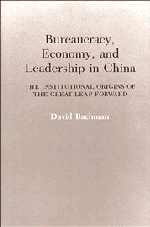Book contents
- Frontmatter
- Contents
- Preface
- Acknowledgments
- Chronology
- 1 Introduction
- Part I Historical background and conceptual approach
- Part II The institutional origins of the Great Leap Forward
- 4 The financial coalition
- 5 The planning and heavy industry coalition
- 6 The Party as agent of social transformation
- 7 The views of the top leadership
- 8 The Third Plenum of the Eighth Central Committee and the Great Leap Forward
- 9 Conclusions
- Appendix: The constraints on Mao
- Bibliography
- Index
8 - The Third Plenum of the Eighth Central Committee and the Great Leap Forward
Published online by Cambridge University Press: 21 March 2010
- Frontmatter
- Contents
- Preface
- Acknowledgments
- Chronology
- 1 Introduction
- Part I Historical background and conceptual approach
- Part II The institutional origins of the Great Leap Forward
- 4 The financial coalition
- 5 The planning and heavy industry coalition
- 6 The Party as agent of social transformation
- 7 The views of the top leadership
- 8 The Third Plenum of the Eighth Central Committee and the Great Leap Forward
- 9 Conclusions
- Appendix: The constraints on Mao
- Bibliography
- Index
Summary
The two agendas of the CCP in 1956–1957 – economic management and political development – were reintegrated at the Third Plenum of the Eighth Central Committee in September–October 1957. The plenum represented the last stand of the financial coalition in its attempt to change the system of economic control. Its spokesmen made telling points, but the reinjection of political concerns into economic issues doomed their efforts. The planning coalition pushed its program, and Mao decisively sided with the planners, inserting into their scheme his own concern for even faster rates of advance. A temporary alliance among planners, leaders, and the Party was formed, with the planners supplying most of the economic plans and the Party and leadership providing mass mobilization and demands for extremely rapid growth. The alliance proved unstable, and within a short time the leadership and the Party supplanted the planners. Nonetheless, the planning coalition's priorities were still central to the emerging Great Leap Forward; heavy industrial interests, especially the metallurgical industry, were well satisfied by the Leap; and planners did much better politically in the Leap than did budgeteers. Yet when the leadership gradually became aware of the errors in its policies, the leadership and Mao in particular turned to the financial coalition, and above all to Chen Yun, to restore balance.
This chapter concentrates on the deliberations of the Third Plenum and briefly surveys the Great Leap Forward from the perspective of the two main economic coalitions.
- Type
- Chapter
- Information
- Bureaucracy, Economy, and Leadership in ChinaThe Institutional Origins of the Great Leap Forward, pp. 191 - 213Publisher: Cambridge University PressPrint publication year: 1991



